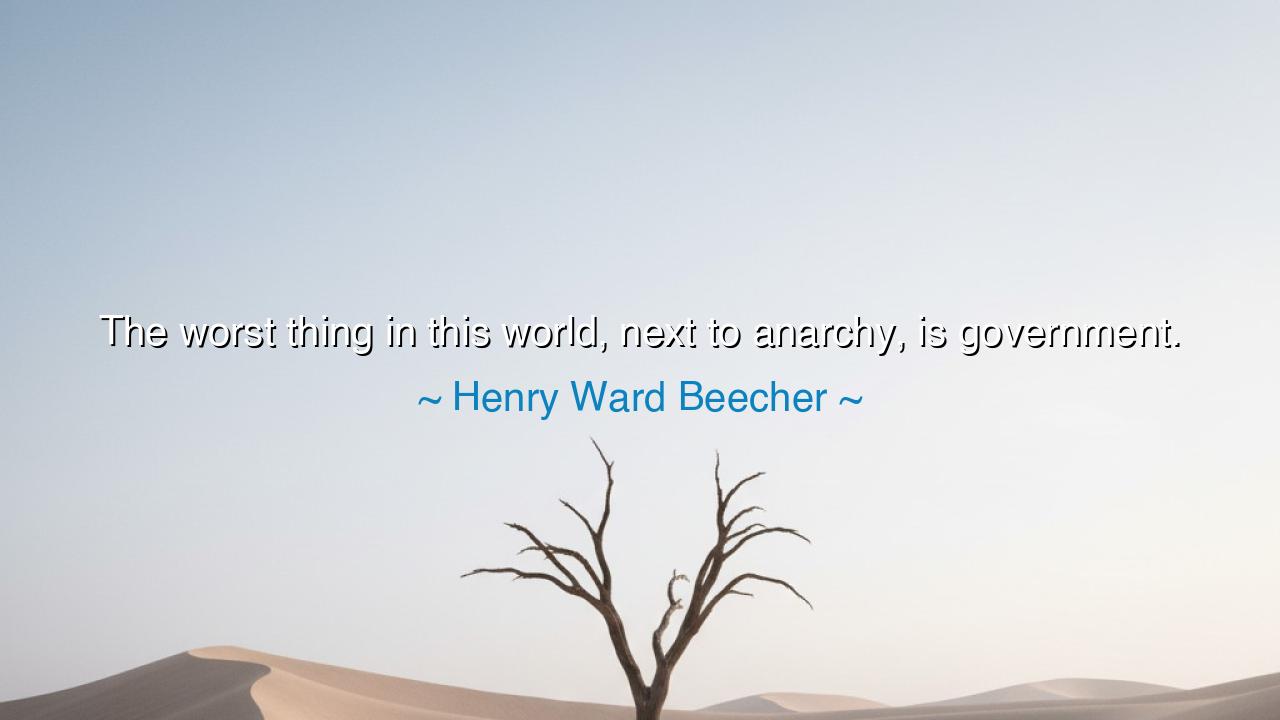
The worst thing in this world, next to anarchy, is government.






"The worst thing in this world, next to anarchy, is government." So spoke Henry Ward Beecher, the fiery preacher and moral voice of nineteenth-century America — a man who saw both the beauty and the danger of power. His words were not the cry of rebellion, but the lament of one who understood that order and freedom are forever locked in a fragile dance. For in the absence of rule, chaos reigns; yet in the excess of rule, the soul itself is shackled. Beecher’s warning stands like a torch in the fog of history — a reminder that the very force which preserves civilization may, if unrestrained, consume it.
To grasp his meaning, one must look into the twin abysses that lie before mankind: anarchy and government. The first is the collapse of all law, the world ungoverned, where might becomes right and justice is drowned in blood. But the second — the danger Beecher calls “next to anarchy” — is the tyranny of too much law, the weight of authority that crushes the breath of liberty. The one devours order; the other devours the human spirit. Between these two gulfs stretches the narrow bridge of freedom, upon which all nations must tread with trembling feet.
Beecher lived in a time when the wounds of civil war were fresh and the powers of the state were growing ever heavier. He had seen governments rise in noble purpose — to defend the enslaved, to preserve the Union — yet watched how easily noble power hardens into cold control. He knew that every law, however well meant, carries the scent of compulsion; that every ruler, no matter how wise, stands at the edge of corruption. To govern is to hold fire — necessary, yes, but perilous. Unwatched, it burns not only the guilty, but the innocent who draw near for warmth.
Look to the history of Rome, that mighty empire whose very grandeur foretold its doom. In its early days, the Republic lived by the voice of the people and the courage of the Senate. But as fear of chaos grew, so too did the reach of government. One decree followed another, one emperor followed another, until liberty became a shadow, and the Senate bowed before the throne. The Romans, weary of anarchy, begged for order — and in doing so, surrendered their freedom. Thus, Beecher’s words echo the fate of all great powers: that when men love safety more than liberty, they invite the slow death of the soul.
Yet Beecher was no enemy of law. He knew that a world without rule is a pit of madness, where no justice can live. His warning was not against governance itself, but against the idolatry of government — the blind faith that rulers can save us, that policies can purify the heart, that bureaucracy can replace virtue. He taught that true order begins within, that the freest nation is not the one most governed, but the one most self-governed. For where conscience rules the heart, there is no need for tyrants to rule the land.
So too did the American founders understand this balance. They built a government strong enough to preserve liberty, yet bound it with chains of law, lest it forget its place. “Power,” said Washington, “is like fire — a dangerous servant and a fearful master.” Beecher’s words are but an echo of that eternal truth. The peril of government is not in its existence, but in its forgetting that it exists to serve, not to rule; to guard, not to command; to restrain the violent, not to bind the free.
Therefore, my children, let this lesson burn within you: fear not government, but revere your freedom more. Watch the state as one watches the edge of a blade — useful in the hand of virtue, deadly in the grip of vice. Do not surrender your conscience to kings, parliaments, or presidents, for none can govern you as justly as your own awakened heart. When you see injustice, speak; when you see tyranny rising in the name of safety, resist with courage and reason. For the price of freedom is not rebellion alone, but eternal vigilance — the quiet strength of citizens who remember that power, however gilded, must always answer to the people.
Thus, let Beecher’s wisdom endure as both warning and guide: that in this world, the only thing worse than the chaos of no ruler is the cold dominion of too much rule. Between those two storms lies the calm sea of liberty — fragile, precious, and alive — where mankind must steer with steady hands, lest the winds of fear or pride drive them once more into darkness.






AAdministratorAdministrator
Welcome, honored guests. Please leave a comment, we will respond soon